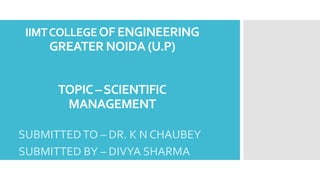
SCIENTIFIC MANAGEMENT.pptx
- 1. IIMTCOLLEGEOF ENGINEERING GREATER NOIDA (U.P) TOPIC –SCIENTIFIC MANAGEMENT SUBMITTEDTO – DR. K N CHAUBEY SUBMITTED BY – DIVYA SHARMA
- 2. Introduction • Frederick Winslow Taylor (March 20, 1856 – March 21, 1915) was an American mechanical engineer. He was widely known for his methods to improve industrial efficiency.[1] • He was one of the first management consultants.[2] In 1909, Taylor summed up his efficiency techniques in his book The Principles of Scientific Management • Frederick Winslow Taylor is known as the Father of Scientific Management, which also came to be known as “Taylorism”.
- 3. Taylor’s main focus: Maximize workers capacity and profits PROBLEM: Get employees to work at their maximum capacity PRIMARY FOCUS: TASKS
- 4. F.WTAYLOR DEFINED SCIENTIFIC MANAGEME NT It is the art of Knowing what exactly you want from your men to do and then seeing that it is done in best possible manner.
- 5. PRINCIPLES OF SCIENTIFIC MANAGEME NT Science, not the rule of the thumb – According to Taylor, scientific management must be put into practice and not the rule of thumb. Rule of thumb refers to the practice of handling the situation as and when it arises by the manager. It heavily relies on the trial and error system
- 6. PRINCIPLES OF SCIENTIFIC MANAGEME NT Harmony, Not Discord- Taylor indicated and believed that the relationship between the workers and management should be cordial and completely harmonious.
- 7. PRINCIPLE OF SCIENTIFIC MANAGEME NT Cooperation, not Individualism- It is similar to ‘Harmony, not discord’ and believes in mutual collaboration between workers and the management.
- 8. PRINCIPLE OF SCIENTIFIC MANAGEME NT Development of Every Person to his Greatest Efficiency- The effectiveness of a company also relies on the abilities and skills of its employees. Thus, implementing training, learning best practices and technology, is the scientific approach to brush up the employee skill.
- 9. PRINCIPLE OF SCIENTIFIC MANAGEME NT Mental Revolution- This technique involves a shift of attitude of management and workers towards each other. Both should understand the value of each other and work with full participation and cooperation.The aim of both should be to improve and boost the profits of the organisation.
- 10. MERITSOF SCIENTIFIC MANAGEME NT Enhanced production: Due to harmonious relationship between management and workers, there will be increased productivity. Ability to control: The employees perform repetitive tasks and are therefore easily controlled by the management. Reduced cost of production: Due to large scale production, there is a marked decrease in the cost per unit of production. Positive work environment: It stimulates management to adopt a healthy relationship with the owners.
- 11. CRITICISM OF SCIENTIFIC MANAGEME NT Exploitation of Workers -Taylor’s Scientific Management put unnecessary pressures on the employees to perform the work faster Problem of Unity of Command-Taylor used functional foremanship. So, the workers have to report to eight bosses.This breaks the principle of unity of command, where the workers have to report to only one boss. Mechanical Approach -Taylor’s approach was a mechanical approach. He gave too much importance to efficiency. He did not consider the human element.